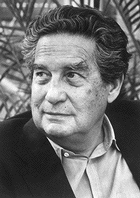| |
|
|
|
|
|
|
Octavio Paz(1914-1998) |
|
|
|
Octavio Paz was born in 1914 in Mexico City. On his father's side, his grandfather was a
prominent liberal intellectual and one of the first authors to write a novel with an expressly
Indian theme. Recipient of Nobel Prize for Literarture(1990), Paz was appointed Mexican ambassador
to India in 1962 : an important moment in both
the poet's life and work, as witnessed in various books written during his stay in India. |
|
Paz was a poet and an essayist. His poetic corpus was nourished by |
|
the belief that poetry constitutes "the secret
religion of the modern age." Eliot Weinberger
has written that, for Paz, "the revolution of
the word is the revolution of the world, and
that both cannot exist without the revolution of
the body : life as art, a return to the mythic
lost unity of thought and body, man and nature,
I and the other." His is a poetry |
|
 |
|
|
written within the perpetual motion and
transparencies of the eternal present tense.
|
|
|
| |
Excerpts from In Light of India |
|
|
|
The philosophical antecedent of Sufism, its origin, is the Spaniard Ibn 'Arabi(1165-1240) who taught the union with God through all His creations. The affinities of Ibn 'Arabi with Neoplatonism are only one aspect of his powerful thought. Love opens the eyes to understanding, and the world of appearances i.e. this world is transformed into a world of apparitions; everything that we touch and see is divine. This synthesis of pantheism and monotheism, of belief in the divinity of the creation (the world) and belief in a creator God, was the basis, centuries later, of the thought of such great mystic poets of India as Tukaram and Kabir.
|
|
A revealing fact : all these mystic poets wrote and sang in the |
|
vernacular languages, not in Sanskrit, Persian or Arabic. Tukaram(1609-1650), who wrote
in Marathi, was a Hindu poet who was unafraid to refer to Islam in terms such as these:
"The first among the great names is that of Allah....".But he immediately affirms his
pantheism : "You are in the One.... In [the vision of the One] there is no I or you....".
During the period of the decline of the Mughal Empire, from the beginning of the eighteenth
century to the middle of the nineteenth century, the coexistence of Hindus and Muslims had
become a less a matter of entrenched opposition as it was under
|
|
|
|
|
Aurangzeb, but it never reached a
state of reconciliation.
|
|
There were political and military pacts between Hindu and Muslim leaders, all of them provisional and dictated by circumstances; but there were no movements of religious or cultural fusion such as those under Akbar or, at the other extreme, of a Kabir or a Tukaram.
|
|
|
|
***** |